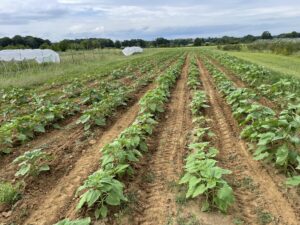Vegetable Crops Edition
Seasonal updates and alerts on insects, diseases, and weeds impacting vegetable crops. New Jersey Commercial Vegetable Production Recommendations updates between annual publication issues are included.
Subscriptions are available via EMAIL and RSS.
Quick Links:
 NJ Commercial Vegetable Production Recommendations
NJ Commercial Vegetable Production Recommendations
 Rutgers Weather Forecasting - Meteorological Information important to commercial agriculture.
Rutgers Weather Forecasting - Meteorological Information important to commercial agriculture.
EPA Update on the Use of the Pesticide Chlorpyrifos on Food
2024 Central Jersey Vegetable Growers Meeting

March 8, 8:30am to 4:00 pm
Monmouth County Agricultural Building
4000 Kozloski Rd. Freehold , NJ 07728
Pesticide Recertification Credits: Core (2), PP2(6), 1A (6), 10 (6)
Registration: $30 (includes coffee, light refreshments in the morning and lunch)
To register, contact Cathy VanBenschoten at the Rutgers Cooperative Extension of Monmouth County Office
732-431-7260 or email at Catherine.VanBenschoten@co.monmouth.nj.us
Click the link below for the full registration form:
There is no online registration. This event is cash, check or purchase order only.
Make checks payable to: Rutgers, the State University of NJ
Mail to: Cathy VanBenschoten
4000 Kozloski Road
Freehold, NJ 07728
This annual event is brought to you by Rutgers Cooperative Extension of Monmouth, Middlesex, Mercer, Burlington, Ocean & Somerset Counties. Seminar topics will benefit those who are involved in commercial production of vegetables and specialty crops.
Agenda
8:30 Registration
9:00 Pesticide Safety for Applicators and Handlers – George Hamilton, Ph.D., Specialist in Pest Management
10:00 Updates on Vegetable Disease Control – Kris Holmstrom, IPM Program Associate in Vegetables
11:00 Break
11:15 Updates from the Vegetable IPM Program – Kris Holmstrom, IPM Program Associate in Vegetables
12:15 Lunch
1:00 Industry and Service Provider Updates – FSA, NRCS, Grown in Monmouth, Tri-County Co-op, NJ Vegetable Growers Association
2:00 NJAES Strawberry Production and Breeding Program – William Hlubik, Agriculture Agent – RCE Middlesex County
2:30 Food Safety and NJ Cottage Food Law – Meredith Melendez, Agriculture Agent – RCE Mercer County
3:00 What You Need to Know About the Manure Link Program – Sandra Howland, Research Scientist NJ Dept. of Agriculture
3:30 Effective Weed Management in Vegetable Crops – Thierry Besancon, Ph.D., Specialist in Weed Science
4:00 Course Evaluation, Pesticide Credits
NJACTS 2024 WPS RESPIRATORY PROTECTION WORKSHOP: Pre-Registration Extended to Next Friday January 26th- just 14 spots open!
Respiratory Protection for Pesticides – Two Rutgers Resources for Growers!
Have A Say in Field Equipment Sanitation Research!
In an initiative to guide future solution and resources, the Specialty Crop Research Initiative (SCRI) has designed the Sanitation of Agricultural Field Equipment Questionnaire to begin the research process centered around field equipment sanitation.
The research will develop a more comprehensive understanding of the challenges associated with field equipment sanitation and work toward developing solutions that are effective, implementable and sustainable.
To introduce the survey and forthcoming research effort, Dr. Matt Grieshop Director at The Grimm Family Center for Organic Production and Research College of Agriculture, Food and Environmental Sciences Cal Poly, San Luis Obispo says,
“We are a group of agricultural research and extension professionals from across the United States that are curious about grower and agricultural professional perceptions about the importance of field equipment sanitation to mitigate the spread of organisms that pose human health, weed, plant pathogen or other risks.
Agricultural field equipment includes tillage implements, tractors, harvesters, cultivation equipment, trucks, trailers, sprayers, mowers, or any other piece of equipment that is shared across fields.
This information will be solely used to help frame future research questions and outreach activities. It will not be published or distributed in any form. Answering should take 5 minutes or less and is completely voluntary and anonymous.
If you have questions, comments or concerns contact Dr. Matt Grieshop at mgriesho@calpoly.edu
Thank you for sharing your experience. We truly appreciate the gift of your time and knowledge.”
Your participation is invaluable to future developments in the industry regarding food safety and equipment sanitation.
To contribute, visit here.
For any questions regarding this project, contact Thierry Besancon at thierry.besancon@rutgers.edu.
——
Thierry E. Besançon, PhD
Associate Professor / Extension Weed Science Specialist
Free webinar: Agritourism Business Planning
Exciting News for Agritourism Entrepreneurs and farm service providers! Join a FREE webinar on January 23rd to unlock the secrets of successful business planning for agritourism businesses!
📅 Event Date: January 23, 2024
🕐 Time: 1-2 p.m. EST
🔗 Register: https://www.uvm.edu/vtrc/future-agritourism-gatherings
Learn about the innovative AgPlan app, a user-friendly tool tailored for various farm enterprises, including agritourism. Discover key steps in business planning and learn about how you can get support developing a personalized business plan through an online training series in February and March.
What to Expect:
-General overview of business planning
-Information on registering for the online training series
-Dive into AgPlan, your go-to business planning app
-Gain valuable insights from Extension business experts
We hope to see you there!
